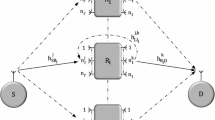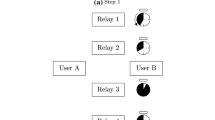Abstract
Outage probability of selective decode-and-forward (DF) relay networks with different relay selection schemes are usually analyzed separately in the literature. In this paper, for selective DF relay networks with selection combining technique, we show that, the three typical relay selection schemes (named as proactive, reactive, and backward reactive relay selection scheme, respectively) are all equivalent with each other in term of outage probability of the networks. Furthermore, this outage probability equivalency is valid even when the wireless channels in the networks are non-identical, interrelated, and with different fading models. Hence, outage probability of a selective DF relay network with one particular relay selection scheme could be obtained indirectly, if necessary, by obtaining the outage probability of the network with another equivalent relay selection scheme but with lower computing complexity.




Similar content being viewed by others
References
Bletsas, A., Shin, H. D., & Win, M. Z. (2007). Cooperative communications with outage-optimal opportunistic relaying. IEEE Transactions on Wireless Communications, 6(9), 1–10.
Sagong, S., Lee, J., & Hong, D. (2011). Capacity of reactive DF scheme in cognitive relay networks. IEEE Transactions on Wireless Communications, 10(10), 3133–3138.
Marvin, K. S., & Alouini, M. S. (2000). Digital communication over fading channels: A unified approach to performance analysis. London: Wiley.
Woradit, K., Quek, T. Q. S., Suwansantisuk, W., Win, M. Z., Wuttisittikulkij, L., & Wymeersch, H. (2009). Outage behavior of selective relaying schemes. IEEE Transactions on Wireless Communications, 8(8), 3890–3895.
Duong, T. Q., Bao, V. N. Q., & Zepernik, H. J. (2009). On the performance of selection decode-and-forward relay networks over Nakagami-m fading channels. IEEE Communications Letters, 13(3), 172–174.
Si, J. B., Li, Z., Huang, H. Y., Chen, J. J., & Gao, R. (2012). Capacity analysis of cognitive relay networks with the PU’s interference. IEEE Communications Letters, 16(12), 2020–2023.
Gopalakrishna, A., & Ha, D. B. (2013). Capacity analysis of cognitive radio relay networks with interference power constraints in fading channels. In Proceedings 2013 international conference on computing, management and telecommunications, Vietnam (pp. 111–116).
Yang, C. Q., Wang, W. B., Zhao, S., & Peng, M. G. (2011). Opportunistic decode-and-forward cooperation in mixed Rayleigh and Rician fading channels. ETRI Journal, 33(2), 287–290.
Bao, V. N. Q., & Duong, T. Q. (2012). Exact outage probability of cognitive underlay DF relay networks with best relay selection. IEICE Transactions on Communications, E95.B, (6), 2169–2173.
Ehsan, S. N., Mehrdad, A., & Ashkan, K. (2014). Performance analysis of selective combining decode-and-forward relay networks over Nakagami-n and Nakagami-q fading channels. Wireless Communications and Mobile Computing, 14(16), 1564C1581.
Chuai, G., Zhang, B. Z., Liu, X. M., & Gao, L. (2009). Outage probability of opportunistic decode-and-forward relaying over Nakagami-m fading channels. The Journal of China Universities of Posts and Telecommunications, 16(5), 46–49.
Duy, T. T., & Kong, H. Y. (2013). Performance analysis of incremental amplify-and-forward relaying protocols with Nth best partial relay selection under interference constraint. Wireless Personal Communications, 71(4), 2741–2757.
Majhi, S., Qian, H., Xiang, W. D., Addepalli, S., & Gao, Z. (2011). Analysis of outage probability for opportunistic decode-and-forward relaying network over asymmetric fading channels. In Proceeding ICUFN2011, Jun. 15 17, Dalian, China (pp. 135–139).
Gao, Z. G., Chen, D. J., Chen, B. C., Yao, N. M., & Tan, G. Z. (2014). Outage analysis of cognitive AF relay networks with multiple primary users and heterogeneous non-identical parameters. Wireless Personal Communications, 79(2), 1031–1051.
Acknowledgments
This work has been supported by Natural Science Foundation of China (No. 61073183); Natural Science Foundation of HeiLongJiang Province (No. F201120); Fundamental Research Funds for the Central Universities (No. 852009); National High Technology Research and Development Program of China (863 Program) (No. 2012 AA111902).
Author information
Authors and Affiliations
Corresponding author
Rights and permissions
About this article
Cite this article
Gao, Z., Chen, D., Chen, B. et al. Outage Probability Equivalency of Three Typical Relay Selection Schemes for Selective DF Relay Networks with Selection Combining. Wireless Pers Commun 85, 1205–1215 (2015). https://doi.org/10.1007/s11277-015-2835-y
Published:
Issue Date:
DOI: https://doi.org/10.1007/s11277-015-2835-y




